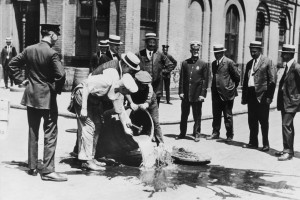
Alcohol is dumped into a New York sewer during the prohibition era, circa 1920. PHOTO: FPG/HULTON ARCHIVE/GETTY IMAGES
It’s been 82 years since the repeal of Prohibition on Dec. 5, 1933, signaled the end of America’s experiment with teetotalism. Though the ban looks like an exercise in futility now, in 1920 many temperance campaigners hailed it as the beginning of a new era. “Prohibition is won, now for tobacco!” went the cry.
Although the U.S. is indelibly associated with Prohibition, authorities the world over have long regarded the pleasures (or vices) of alcohol, tobacco and coffee with deep suspicion. Concerns about these habit-forming substances’ potential health hazards didn’t provoke the official hostility. Instead it often came from paranoia over what the masses might get up to if allowed to let off a little steam without supervision.
The Chinese emperors were among the first to regard the convivial nature of alcohol as a threat to political control. Their attempts to restrict its consumption, according to Chinese legend, began around 2070 B.C. with Yu the Great, founder of the Xia, China’s earliest dynasty. He declared an outright alcohol ban. Subsequent emperors balked at being quite so drastic, but they tried almost everything else, from forbidding three or more people to drink together “for no reason” to making it a capital crime for courtesans to be caught drinking. Continue reading…





